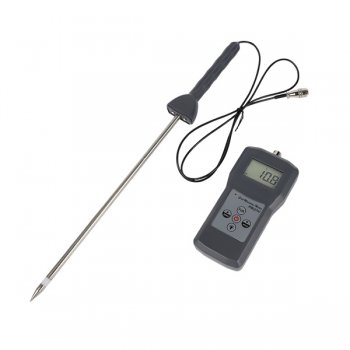The Ultimate Guide to Dampness Meters: A Comprehensive Introduction and Exactly How They Can Save You Money
Moisture meters serve as indispensable tools in spotting and keeping track of moisture web content in materials, aiding in protecting against costly damages and ensuring the high quality of items. Recognizing the nuances of various types of dampness meters, their applications, and the potential cost-saving advantages they supply can be a game-changer for experts and organizations alike.
Kinds Of Moisture Meters
Different sorts of moisture meters are available for different applications in different markets. One common type is the pin-type wetness meter, which gauges the electric resistance in between two pins put into a material. This type appropriates for wood, drywall, and other structure materials. Pinless moisture meters, on the other hand, use electromagnetic sensor plates to scan a bigger area without causing damage to the material's surface. Moisture Meter. These meters are optimal for promptly assessing moisture levels in large areas such as walls and floors.

Infrared moisture meters determine the thermal homes of a product to identify its dampness content non-invasively, making them useful for applications where pin or pinless meters might not be suitable. Recognizing the different kinds of moisture meters offered can aid industries choose the most appropriate tool for their details moisture measurement requirements.

Advantages of Using Wetness Meters
Dampness meters supply invaluable benefits in properly examining and checking wetness levels in varied products and atmospheres. One of the main benefits of making use of moisture meters is the prevention of possible damages caused by excess wetness.
Additionally, utilizing dampness meters can lead to boosted energy efficiency. By determining areas with high moisture degrees, such as leaks or inadequate insulation, changes can be made to boost power conservation and decrease utility costs. In agricultural setups, moisture meters play a vital duty in maximizing crop yields by making it possible for farmers to keep an eye on dirt moisture degrees and make informed irrigation choices. On the whole, the benefits of making use of moisture meters cover across various markets, supplying cost-efficient remedies and promoting much better quality control techniques.
Just How to Pick the Right Dampness Meter
When choosing a moisture meter, it's vital to ensure that the meter is appropriate for the details material you will certainly be screening. Different products have varying electrical residential properties that can affect wetness analyses, so selecting a meter designed for your material is essential for exact results. By carefully evaluating these aspects, you can select a dampness meter that meets your needs and provides accurate moisture dimensions for your tasks.
Appropriate Methods for Moisture Meter Usage

Expense Savings Through Moisture Meter Applications
Exactly how can the strategic application of wetness meters lead to considerable price savings across different industries? In the farming industry, dampness meters aid in establishing the ideal time for harvesting plants, avoiding excess or over-drying moisture that can influence the final item's top quality.
Similarly, in building and construction, dampness meters assist stop expensive problems by detecting wetness levels in structure products, such as wood or concrete, which can bring about structural issues otherwise addressed immediately. By identifying issue locations at an early stage, service providers can take corrective steps to stay clear of extensive repair services or substitutes, ultimately saving money and time.
Furthermore, in the food processing industry, wetness meters are crucial for keeping track of product top quality and ensuring compliance with security guidelines. By precisely gauging moisture content in food items, makers can protect against spoilage, maintain freshness, and minimize waste, causing significant cost savings. In general, the calculated application of wetness meters is a beneficial financial investment that can lead to considerable expense decreases and enhanced effectiveness across different markets.
Final Thought
Finally, moisture meters are valuable tools for measuring and spotting moisture levels in numerous materials. By using the best moisture meter and following proper strategies, customers can successfully stop expensive problems triggered by excess wetness. Investing in a quality dampness meter can cause considerable cost financial savings over time by identifying potential concerns check my site early and allowing prompt removal. Eventually, moisture meters are essential instruments for keeping the stability and longevity of products and structures.
Wetness meters serve as crucial tools in identifying and keeping an eye on moisture web content in materials, assisting in avoiding pricey damages and making certain the quality of items. Infrared dampness meters determine the thermal homes of a product to identify its dampness content non-invasively, making them helpful for applications where pin or pinless meters might not be ideal.Moisture meters provide very useful advantages in accurately keeping an eye on and examining moisture degrees in varied products and atmospheres. In agricultural setups, dampness meters play an essential function in enhancing plant returns by enabling farmers to keep track of dirt dampness degrees and make informed irrigation decisions.In final thought, wetness meters are useful devices for measuring and identifying dampness levels in different products.